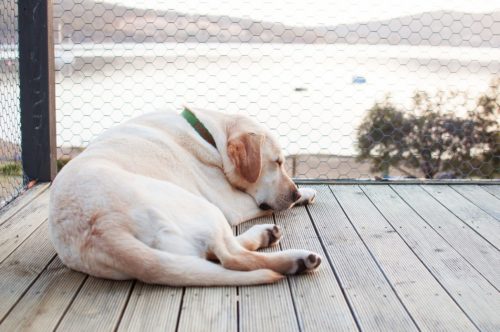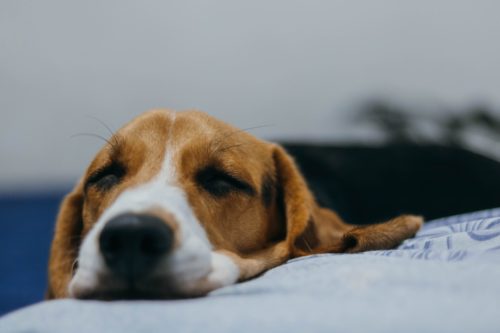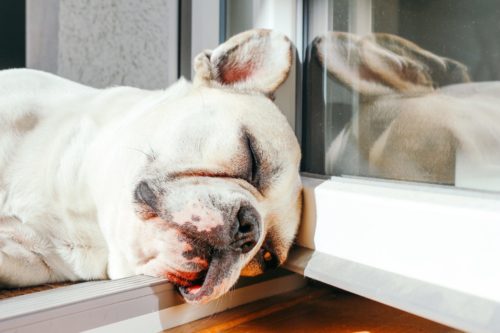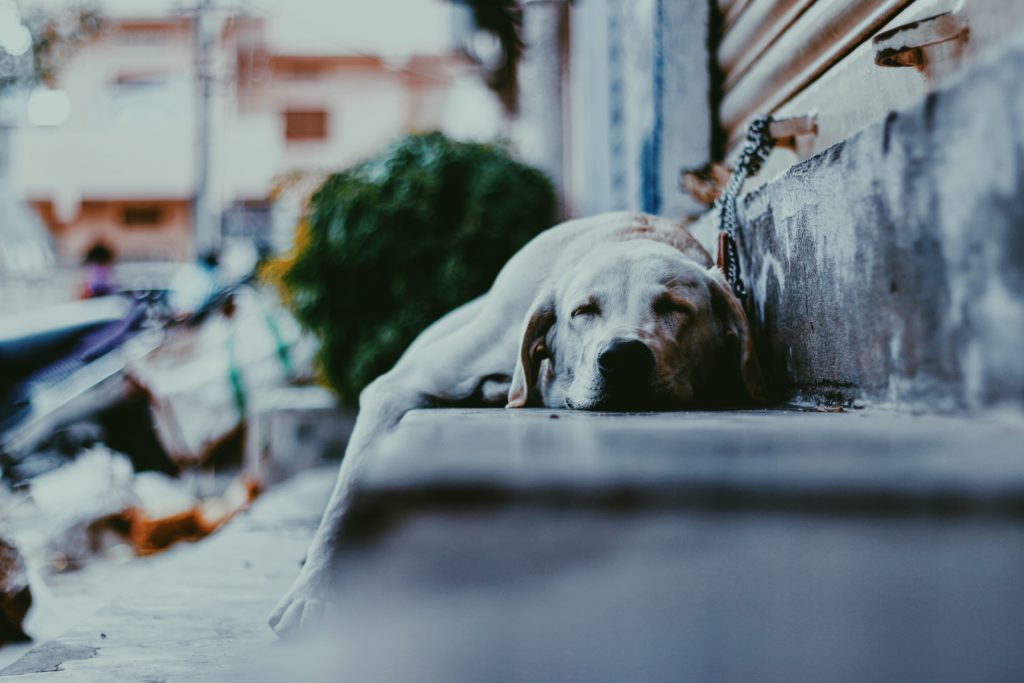Did you know that dogs can have sleep disorders just like humans?
This might not be that surprising given just how much dogs seem to sleep, but if your dog looks like he is extra tired during the day, wakes up and whines during the night, seems to fall asleep suddenly or has trouble sleeping, then your dog may have a sleep disorder.
A big sleep disorder among dogs is sleep apnea. Wait… Can a dog have sleep apnea? It’s easy to chuckle if your dog snores, but if your dog is an especially loud snorer, it may point to a larger problem at hand.
This post will cover sleep disorders in dogs, including a deep dive into sleep apnea.
Common Dog Sleep Disorders
There are some significant differences between the more common sleep disorders in dogs.
Insomnia
First up is insomnia, which simply refers to a dog who has trouble sleeping. This may involve having a tough time getting to sleep at the start of the night or waking up in the middle of the night and not being able to fall back to sleep. Often, insomnia is a symptom of another underlying condition, such as canine anxiety, an illness, an injury, or just old age. Old age makes a dog more susceptible to discomfort because of joint or canine digestive issues.
Narcolepsy
A rare but noteworthy sleep disorder that has been documented in dogs, canine narcolepsy causes a disruption in a dog’s REM sleep cycle, which can make the dog seem lethargic or super tired during the day. When a dog has narcolepsy, he will suddenly collapse, even right in the middle of an activity, and immediately appear to fall fast asleep.
Generally, the dog will spring right back to life within a few moments or minutes, however, narcolepsy can be dangerous if your dog has access to a pool or body of water.
REM Behavior Disorder and Periodic Limb Movement Disorder
Dogs often paw at the air while they sleep, and some are quite active during REM cycles, and even show symptoms of a human sleep disorder called REM behavior disorder. Dogs with an overactive REM cycle can run into walls, attack inanimate objects, or bite during an episode. It is slightly different from sleepwalking, as the dogs will not seem disoriented if they are woken up.
Sleep Apnea
If your dog has a bad snoring problem, it might be a sign of sleep apnea. Most commonly seen in English Bulldogs and other obese dogs, sleep apnea causes breathing difficulties in dogs during sleep.
Dogs with sleep apnea may temporarily stop breathing while they are asleep, which hopefully will wake them up. If this occurs frequently during the night, the dog won’t be able to have uninterrupted REM sleep, which could make your dog extra tired during the day.
No matter which sleep disorder you suspect your dog of having, it’s important to talk with your veterinarian. Not getting enough sleep or proper sleep can be just as harmful to dogs as it is to humans, so it is best to put together a plan with your vet to help your dog sleep better, otherwise, it could lead to mental, emotional, or canine health problems.
While you might be surprised to learn that dogs can indeed have sleep apnea, you may be comforted by the fact that it is quite rare. Snoring is usually just snoring, but sometimes it can be a warning sign of an underlying problem like sleep apnea.
The problem is, if your dog is one of the few who has sleep apnea, it can be a serious issue if it is not addressed properly. At the very least it will disrupt your dog’s good night of rest, but in severe cases, sleep apnea can cause death.
Snoring Dogs: Is My Dog at Risk for Sleep Apnea?
Although it might seem pretty adorable to having a snoring pup, if that snoring is overly loud then it may be cause for some concern.
Just like with humans, excessively loud snoring may be a sign of a sleep disorder like sleep apnea, a condition in which you stop breathing briefly while you are asleep. Although it is rare in canines, it is a serious condition that can cause death.
Therefore it is normal to be concerned about your dog’s snoring even if the chance it has sleep apnea is quite low. But when do you take your dog in to see a veterinarian? Before we get there, let’s look at what dogs are typically on the list of “loudest snorers.”
What Dog Breeds Are Predisposed to Snoring?
Short-snouted dogs such as the English Bulldog, French Bulldog, Shih Tzu, Boston Terrier, Cavalier King Charles Spaniel, Boxer, and Pug are known to be snorers. This is because these breeds are brachycephalic, which characterizes these breeds as having broad, short skulls and short snouts, meaning they have short breathing passages. Not only do they snore, but they also have trouble breathing in general.
Having a breed that is more susceptible to snoring does not mean you automatically need to take your dog into the vet to check out his behavior, just like having a dog of another breed does not mean you’re off the hook. It just means that some are more susceptible than others.
The cause for the difficulty breathing and the snoring in certain breeds is unfortunately due to breeding practices to create those adorably pudgy faces. The snouts of the dogs get shorter and shorter, but the soft palate in the back of their throats isn’t getting any smaller, which continues to cause louder snoring and worsening breathing issues.
Factors that play into a dog’s snoring include his position when sleeping, the shape of his neck, and the length of his nose.
 What Causes Snoring in Dogs?
What Causes Snoring in Dogs?
Snoring in dogs occurs when air movement is restricted in the dog’s nasal passageways or throat, exactly as it occurs in humans. Much of the reason for dog’s snoring is a preference to sleep on their backs, especially in breeds like English and French Bulldogs. When a dog sleeps on his back, his tongue will partially block some of the air movement in their passageways, which causes them to snore.
Other times, dogs have allergic reactions to dust or second-hand smoke, which can also cause snoring. Some underlying health issues can also cause snoring, such as an abscessed tooth that has made its way into the nasal passageways.
Sometimes the snoring will point to an issue like sleep apnea or hypothyroidism, although these are rare.
Snoring & Sleep Apnea in Dogs
Sleep apnea has received more attention lately, likely because breeds like the English and French Bulldog continue to be extremely popular, and are the breeds that sleep apnea is seen in the most. The good news is that treatment options have increased in recent years as well.
The compact facial structure of these breeds of dog affects their airways and increases their likelihood of snoring and raises their chances of developing sleep apnea. Because of this, their snoring may be accompanied by frequent, abrupt awakenings in which the dog appears to be choking or gasping for air. And that’s because they are — sleep apnea actually causes the dog to stop breathing during sleep.
This can be scary for an owner to witness, especially armed with the knowledge that sometimes, they actually don’t wake up.
Symptoms of Sleep Apnea in Dogs
The most common symptom of sleep apnea in dogs is loud, recurrent snoring. Loud snoring does not always point to sleep apnea, but it will likely be the first symptom that you will notice.
If your dog is a loud snorer, you should pay close attention to his behavior both while he is sleeping and after he wakes up. Beyond the loud, frequent snoring, dogs with sleep apnea will also seem to choke or gasp for air while they are sleeping — a telltale sign of sleep apnea.
Since sleep apnea often wakes the dog up during the night, you may find that your dog is sleeping more during the day, or seems more tired or irritable in general.
Causes of Sleep Apnea in Dogs
There are several common causes of sleep apnea in dogs, including canine allergies, obesity, and nasal obstructions.
Allergies can affect a dog’s airways to the point that they close them off, making sleep apnea a real possibility. Dogs are susceptible to seasonal allergies, food allergies, and can be allergic to toxins in the environment, and each can have a profound effect on their breathing. In these instances, your veterinarian may prescribe allergy medication and a hypoallergenic diet to help keep the allergies at bay, which will also hopefully address the sleep apnea.
Dogs that are overweight are also more susceptible to sleep apnea because excess fat in the back of a dog’s throat and neck can increase airway obstruction. Sometimes, the tissue can collapse the airway entirely, blocking breath completely, which is when an apnea occurs.
As mentioned above, breeding practices have also made several breeds more susceptible to sleep apnea because their airways are getting shorter in the name of appearance.
When to See Your Veterinarian
While snoring isn’t always a sign of sleep apnea, it’s probably best to just have your dog checked out rather than risk it. You can’t be tasked with staying up all night to monitor your dog’s breathing and will rest easy having a diagnosis either way.
This is especially true if your dog’s snoring has reached the point that it is affecting your sleep or that of anyone else in your family. If your dog appears to wake himself up during the night gasping for air, you should bring him in immediately. Likewise, if you notice he stops breathing at any point during the night, it is a surefire sign of an apnea and needs to be addressed.
Whenever you have a regular dog checkup, it is a good idea to mention if your dog is a snorer. Veterinarians have a variety of diagnostic tools they can use to test your dog for sleep apnea, however, they will lean on detailed reporting from the dog’s owner to make a proper diagnosis.
Treatment for Sleep Apnea in Dogs
Veterinarians will often prescribe weight loss diets for obese or overweight dogs with sleep apnea to help address the airway blockage. Bringing the dog’s weight down to a healthy level can help the dog breathe better and open up his nasal passageways. You can even use a humidifier to help open up airways during this process and moving forward.
Overall, a snoring dog should not be dismissed, as the chance of sleep apnea could be very serious. Proper treatment can help address a dog’s sleep apnea and reduce its risk for potentially fatal consequences. Stop snoring together and enjoy and more peaceful sleep.




